An Analysis of Entrepreneurship and Small Business Management - Report
VerifiedAdded on 2020/10/23
|21
|6025
|109
Report
AI Summary
This report delves into the multifaceted world of entrepreneurship and small business management. It begins by defining entrepreneurship and small businesses, exploring various venture types like micro, small, medium, and large enterprises, as well as scalable, social, and serial enterprises. The report then examines the activities involved in entrepreneurship, including planning, forecasting, and networking, while also differentiating between different types of ventures such as small businesses, lifestyle businesses, social good businesses, and scalable startups. A key focus is placed on the impact of micro and small businesses on the UK economy, including their role in job creation and contribution to turnover. Furthermore, the report outlines the similarities and differences between entrepreneurial ventures, and it contrasts serial entrepreneurs, intrapreneurs, and owner managers. Finally, it explores the environmental factors that can either hinder or foster entrepreneurship, providing a comprehensive overview of the subject matter.

Entrepreneurship and Small
Business Management
Business Management
Paraphrase This Document
Need a fresh take? Get an instant paraphrase of this document with our AI Paraphraser
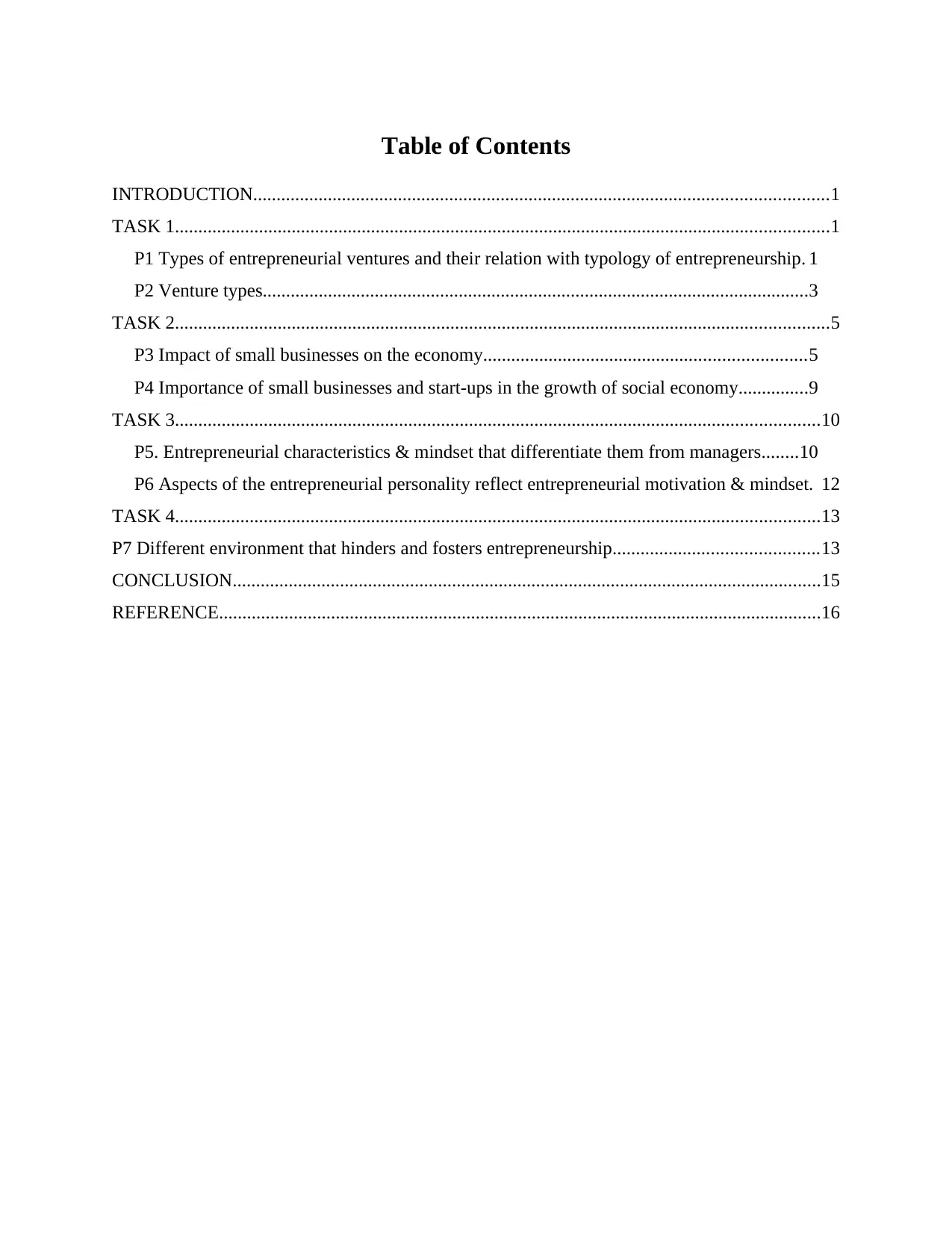
Table of Contents
INTRODUCTION...........................................................................................................................1
TASK 1............................................................................................................................................1
P1 Types of entrepreneurial ventures and their relation with typology of entrepreneurship. 1
P2 Venture types.....................................................................................................................3
TASK 2............................................................................................................................................5
P3 Impact of small businesses on the economy.....................................................................5
P4 Importance of small businesses and start-ups in the growth of social economy...............9
TASK 3..........................................................................................................................................10
P5. Entrepreneurial characteristics & mindset that differentiate them from managers........10
P6 Aspects of the entrepreneurial personality reflect entrepreneurial motivation & mindset. 12
TASK 4..........................................................................................................................................13
P7 Different environment that hinders and fosters entrepreneurship............................................13
CONCLUSION..............................................................................................................................15
REFERENCE.................................................................................................................................16
INTRODUCTION...........................................................................................................................1
TASK 1............................................................................................................................................1
P1 Types of entrepreneurial ventures and their relation with typology of entrepreneurship. 1
P2 Venture types.....................................................................................................................3
TASK 2............................................................................................................................................5
P3 Impact of small businesses on the economy.....................................................................5
P4 Importance of small businesses and start-ups in the growth of social economy...............9
TASK 3..........................................................................................................................................10
P5. Entrepreneurial characteristics & mindset that differentiate them from managers........10
P6 Aspects of the entrepreneurial personality reflect entrepreneurial motivation & mindset. 12
TASK 4..........................................................................................................................................13
P7 Different environment that hinders and fosters entrepreneurship............................................13
CONCLUSION..............................................................................................................................15
REFERENCE.................................................................................................................................16
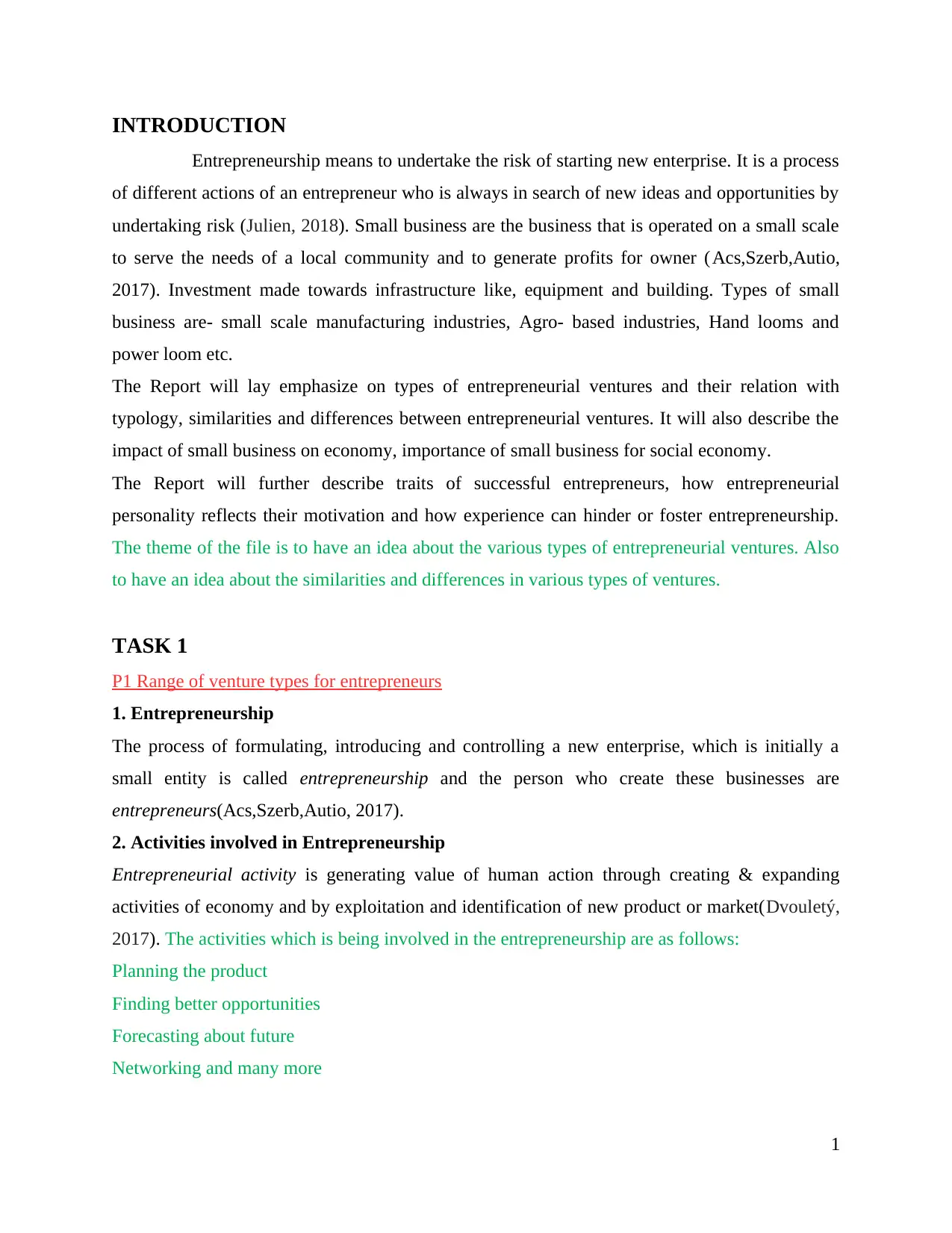
INTRODUCTION
Entrepreneurship means to undertake the risk of starting new enterprise. It is a process
of different actions of an entrepreneur who is always in search of new ideas and opportunities by
undertaking risk (Julien, 2018). Small business are the business that is operated on a small scale
to serve the needs of a local community and to generate profits for owner (Acs,Szerb,Autio,
2017). Investment made towards infrastructure like, equipment and building. Types of small
business are- small scale manufacturing industries, Agro- based industries, Hand looms and
power loom etc.
The Report will lay emphasize on types of entrepreneurial ventures and their relation with
typology, similarities and differences between entrepreneurial ventures. It will also describe the
impact of small business on economy, importance of small business for social economy.
The Report will further describe traits of successful entrepreneurs, how entrepreneurial
personality reflects their motivation and how experience can hinder or foster entrepreneurship.
The theme of the file is to have an idea about the various types of entrepreneurial ventures. Also
to have an idea about the similarities and differences in various types of ventures.
TASK 1
P1 Range of venture types for entrepreneurs
1. Entrepreneurship
The process of formulating, introducing and controlling a new enterprise, which is initially a
small entity is called entrepreneurship and the person who create these businesses are
entrepreneurs(Acs,Szerb,Autio, 2017).
2. Activities involved in Entrepreneurship
Entrepreneurial activity is generating value of human action through creating & expanding
activities of economy and by exploitation and identification of new product or market(Dvouletý,
2017). The activities which is being involved in the entrepreneurship are as follows:
Planning the product
Finding better opportunities
Forecasting about future
Networking and many more
1
Entrepreneurship means to undertake the risk of starting new enterprise. It is a process
of different actions of an entrepreneur who is always in search of new ideas and opportunities by
undertaking risk (Julien, 2018). Small business are the business that is operated on a small scale
to serve the needs of a local community and to generate profits for owner (Acs,Szerb,Autio,
2017). Investment made towards infrastructure like, equipment and building. Types of small
business are- small scale manufacturing industries, Agro- based industries, Hand looms and
power loom etc.
The Report will lay emphasize on types of entrepreneurial ventures and their relation with
typology, similarities and differences between entrepreneurial ventures. It will also describe the
impact of small business on economy, importance of small business for social economy.
The Report will further describe traits of successful entrepreneurs, how entrepreneurial
personality reflects their motivation and how experience can hinder or foster entrepreneurship.
The theme of the file is to have an idea about the various types of entrepreneurial ventures. Also
to have an idea about the similarities and differences in various types of ventures.
TASK 1
P1 Range of venture types for entrepreneurs
1. Entrepreneurship
The process of formulating, introducing and controlling a new enterprise, which is initially a
small entity is called entrepreneurship and the person who create these businesses are
entrepreneurs(Acs,Szerb,Autio, 2017).
2. Activities involved in Entrepreneurship
Entrepreneurial activity is generating value of human action through creating & expanding
activities of economy and by exploitation and identification of new product or market(Dvouletý,
2017). The activities which is being involved in the entrepreneurship are as follows:
Planning the product
Finding better opportunities
Forecasting about future
Networking and many more
1
⊘ This is a preview!⊘
Do you want full access?
Subscribe today to unlock all pages.

Trusted by 1+ million students worldwide
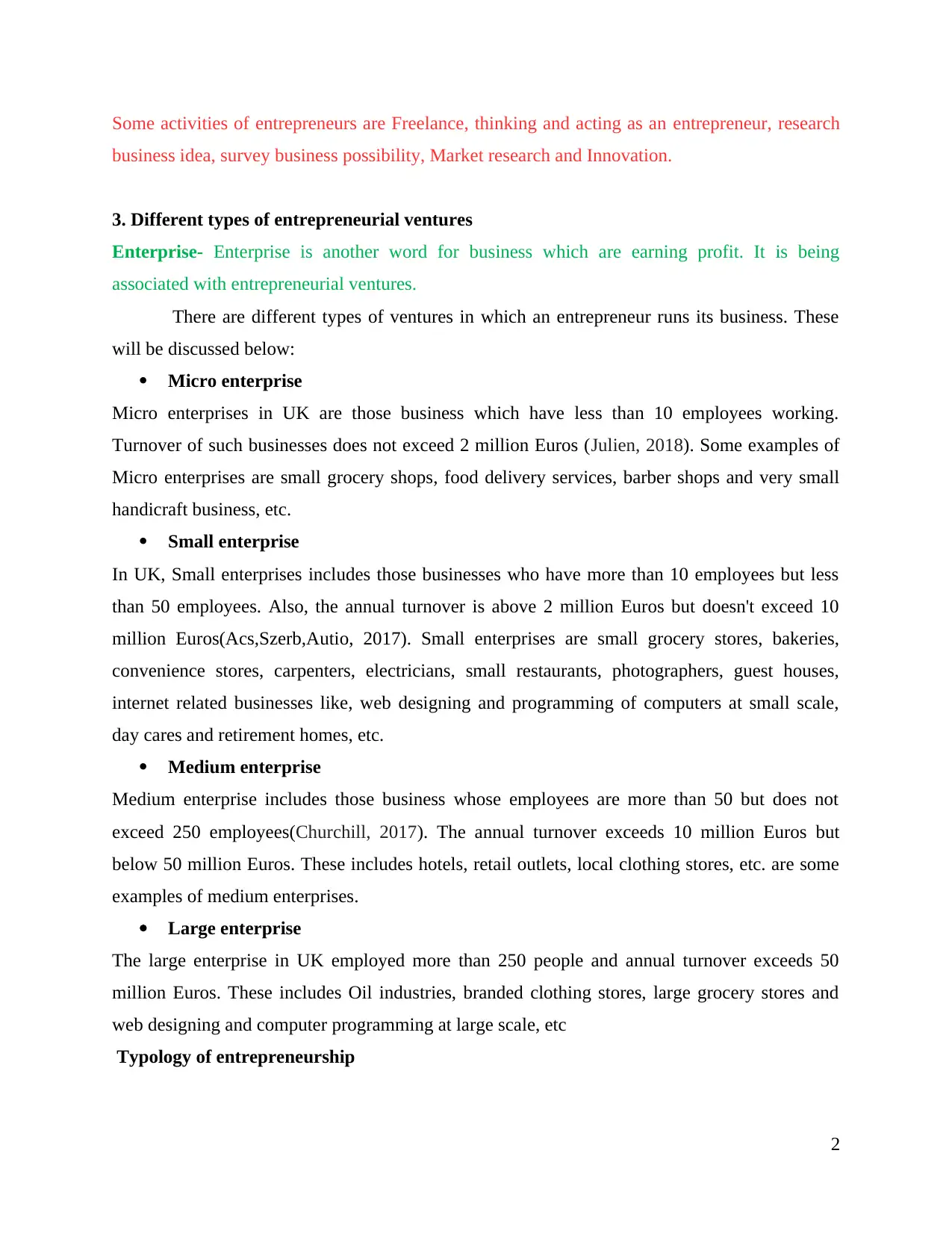
Some activities of entrepreneurs are Freelance, thinking and acting as an entrepreneur, research
business idea, survey business possibility, Market research and Innovation.
3. Different types of entrepreneurial ventures
Enterprise- Enterprise is another word for business which are earning profit. It is being
associated with entrepreneurial ventures.
There are different types of ventures in which an entrepreneur runs its business. These
will be discussed below:
Micro enterprise
Micro enterprises in UK are those business which have less than 10 employees working.
Turnover of such businesses does not exceed 2 million Euros (Julien, 2018). Some examples of
Micro enterprises are small grocery shops, food delivery services, barber shops and very small
handicraft business, etc.
Small enterprise
In UK, Small enterprises includes those businesses who have more than 10 employees but less
than 50 employees. Also, the annual turnover is above 2 million Euros but doesn't exceed 10
million Euros(Acs,Szerb,Autio, 2017). Small enterprises are small grocery stores, bakeries,
convenience stores, carpenters, electricians, small restaurants, photographers, guest houses,
internet related businesses like, web designing and programming of computers at small scale,
day cares and retirement homes, etc.
Medium enterprise
Medium enterprise includes those business whose employees are more than 50 but does not
exceed 250 employees(Churchill, 2017). The annual turnover exceeds 10 million Euros but
below 50 million Euros. These includes hotels, retail outlets, local clothing stores, etc. are some
examples of medium enterprises.
Large enterprise
The large enterprise in UK employed more than 250 people and annual turnover exceeds 50
million Euros. These includes Oil industries, branded clothing stores, large grocery stores and
web designing and computer programming at large scale, etc
Typology of entrepreneurship
2
business idea, survey business possibility, Market research and Innovation.
3. Different types of entrepreneurial ventures
Enterprise- Enterprise is another word for business which are earning profit. It is being
associated with entrepreneurial ventures.
There are different types of ventures in which an entrepreneur runs its business. These
will be discussed below:
Micro enterprise
Micro enterprises in UK are those business which have less than 10 employees working.
Turnover of such businesses does not exceed 2 million Euros (Julien, 2018). Some examples of
Micro enterprises are small grocery shops, food delivery services, barber shops and very small
handicraft business, etc.
Small enterprise
In UK, Small enterprises includes those businesses who have more than 10 employees but less
than 50 employees. Also, the annual turnover is above 2 million Euros but doesn't exceed 10
million Euros(Acs,Szerb,Autio, 2017). Small enterprises are small grocery stores, bakeries,
convenience stores, carpenters, electricians, small restaurants, photographers, guest houses,
internet related businesses like, web designing and programming of computers at small scale,
day cares and retirement homes, etc.
Medium enterprise
Medium enterprise includes those business whose employees are more than 50 but does not
exceed 250 employees(Churchill, 2017). The annual turnover exceeds 10 million Euros but
below 50 million Euros. These includes hotels, retail outlets, local clothing stores, etc. are some
examples of medium enterprises.
Large enterprise
The large enterprise in UK employed more than 250 people and annual turnover exceeds 50
million Euros. These includes Oil industries, branded clothing stores, large grocery stores and
web designing and computer programming at large scale, etc
Typology of entrepreneurship
2
Paraphrase This Document
Need a fresh take? Get an instant paraphrase of this document with our AI Paraphraser
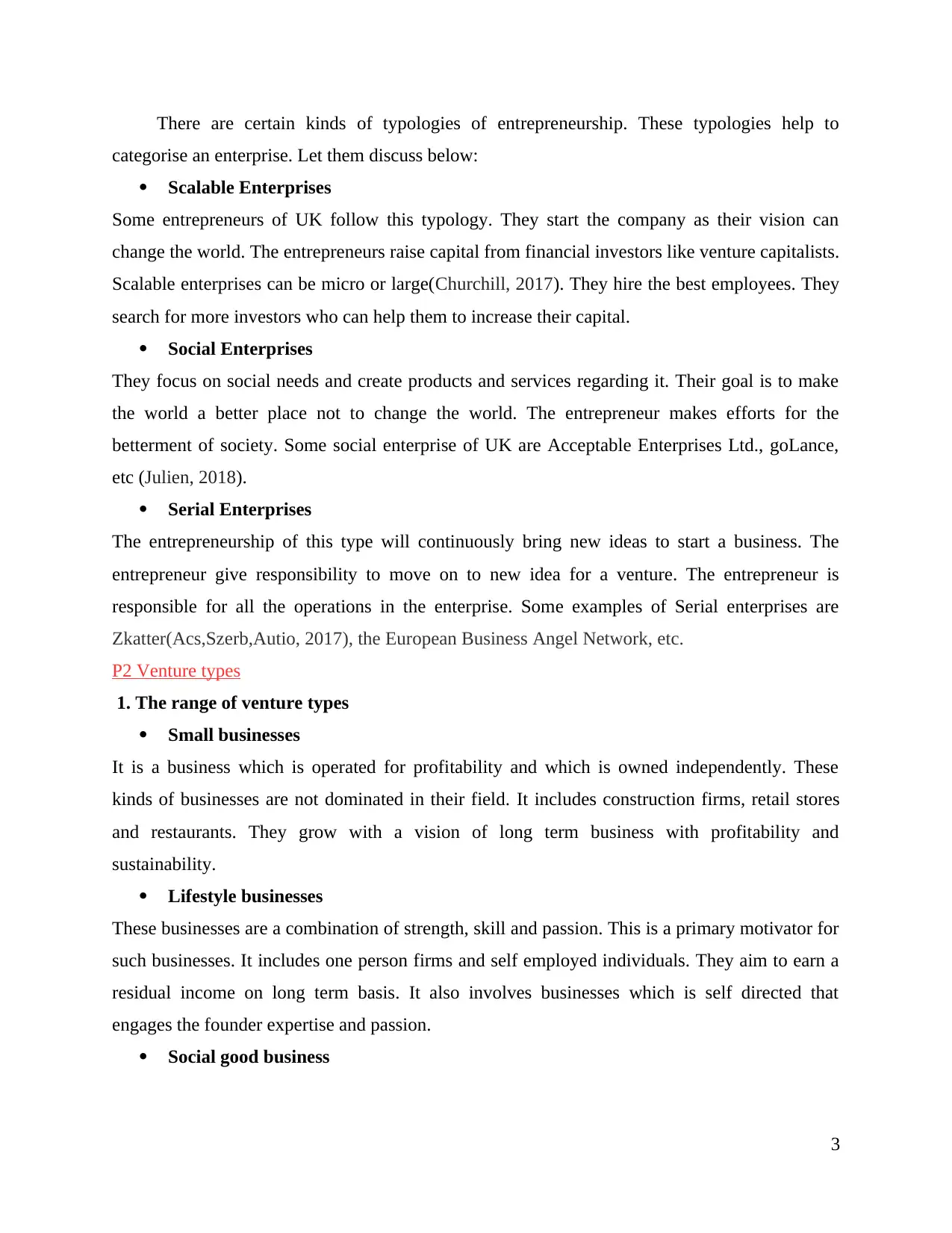
There are certain kinds of typologies of entrepreneurship. These typologies help to
categorise an enterprise. Let them discuss below:
Scalable Enterprises
Some entrepreneurs of UK follow this typology. They start the company as their vision can
change the world. The entrepreneurs raise capital from financial investors like venture capitalists.
Scalable enterprises can be micro or large(Churchill, 2017). They hire the best employees. They
search for more investors who can help them to increase their capital.
Social Enterprises
They focus on social needs and create products and services regarding it. Their goal is to make
the world a better place not to change the world. The entrepreneur makes efforts for the
betterment of society. Some social enterprise of UK are Acceptable Enterprises Ltd., goLance,
etc (Julien, 2018).
Serial Enterprises
The entrepreneurship of this type will continuously bring new ideas to start a business. The
entrepreneur give responsibility to move on to new idea for a venture. The entrepreneur is
responsible for all the operations in the enterprise. Some examples of Serial enterprises are
Zkatter(Acs,Szerb,Autio, 2017), the European Business Angel Network, etc.
P2 Venture types
1. The range of venture types
Small businesses
It is a business which is operated for profitability and which is owned independently. These
kinds of businesses are not dominated in their field. It includes construction firms, retail stores
and restaurants. They grow with a vision of long term business with profitability and
sustainability.
Lifestyle businesses
These businesses are a combination of strength, skill and passion. This is a primary motivator for
such businesses. It includes one person firms and self employed individuals. They aim to earn a
residual income on long term basis. It also involves businesses which is self directed that
engages the founder expertise and passion.
Social good business
3
categorise an enterprise. Let them discuss below:
Scalable Enterprises
Some entrepreneurs of UK follow this typology. They start the company as their vision can
change the world. The entrepreneurs raise capital from financial investors like venture capitalists.
Scalable enterprises can be micro or large(Churchill, 2017). They hire the best employees. They
search for more investors who can help them to increase their capital.
Social Enterprises
They focus on social needs and create products and services regarding it. Their goal is to make
the world a better place not to change the world. The entrepreneur makes efforts for the
betterment of society. Some social enterprise of UK are Acceptable Enterprises Ltd., goLance,
etc (Julien, 2018).
Serial Enterprises
The entrepreneurship of this type will continuously bring new ideas to start a business. The
entrepreneur give responsibility to move on to new idea for a venture. The entrepreneur is
responsible for all the operations in the enterprise. Some examples of Serial enterprises are
Zkatter(Acs,Szerb,Autio, 2017), the European Business Angel Network, etc.
P2 Venture types
1. The range of venture types
Small businesses
It is a business which is operated for profitability and which is owned independently. These
kinds of businesses are not dominated in their field. It includes construction firms, retail stores
and restaurants. They grow with a vision of long term business with profitability and
sustainability.
Lifestyle businesses
These businesses are a combination of strength, skill and passion. This is a primary motivator for
such businesses. It includes one person firms and self employed individuals. They aim to earn a
residual income on long term basis. It also involves businesses which is self directed that
engages the founder expertise and passion.
Social good business
3
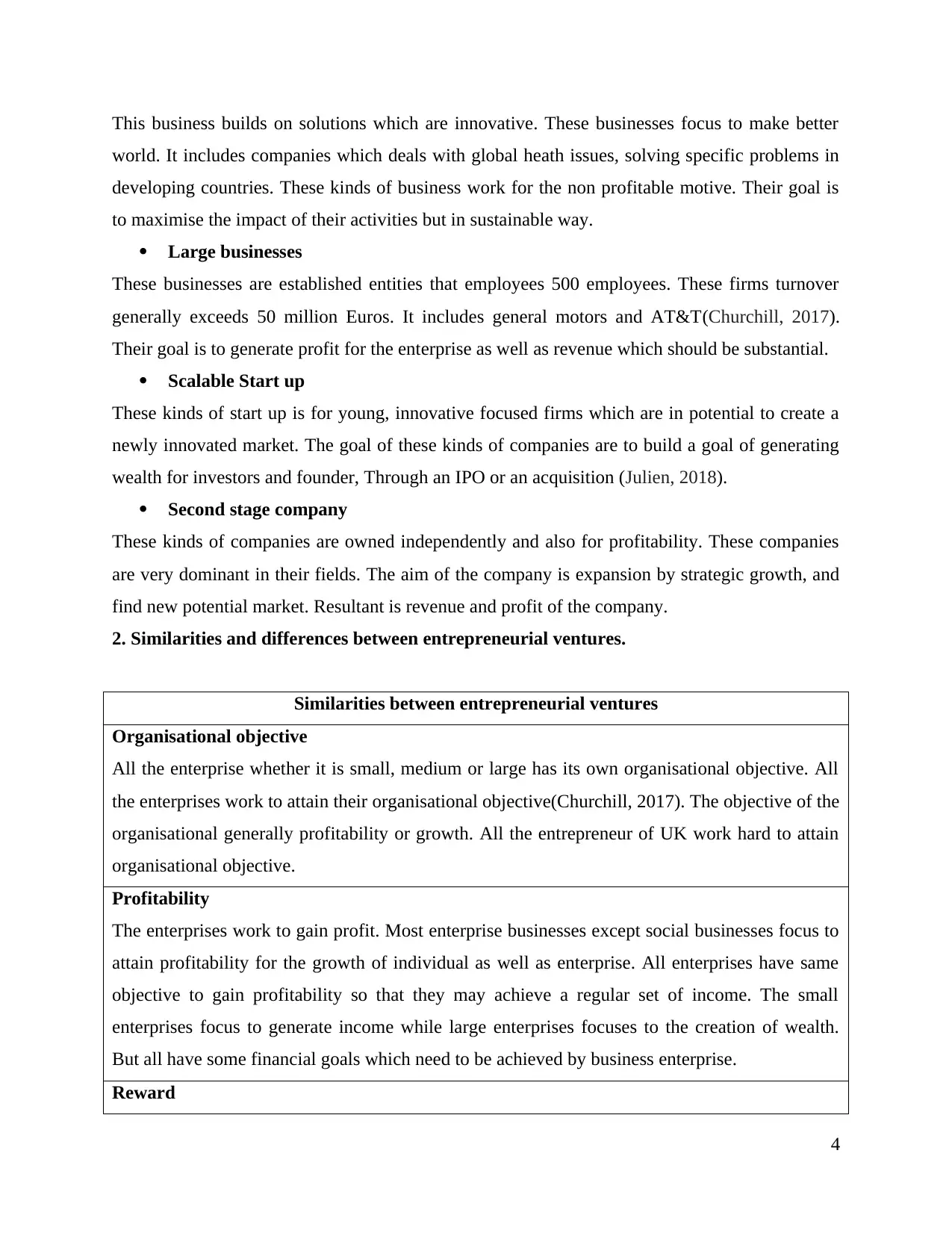
This business builds on solutions which are innovative. These businesses focus to make better
world. It includes companies which deals with global heath issues, solving specific problems in
developing countries. These kinds of business work for the non profitable motive. Their goal is
to maximise the impact of their activities but in sustainable way.
Large businesses
These businesses are established entities that employees 500 employees. These firms turnover
generally exceeds 50 million Euros. It includes general motors and AT&T(Churchill, 2017).
Their goal is to generate profit for the enterprise as well as revenue which should be substantial.
Scalable Start up
These kinds of start up is for young, innovative focused firms which are in potential to create a
newly innovated market. The goal of these kinds of companies are to build a goal of generating
wealth for investors and founder, Through an IPO or an acquisition (Julien, 2018).
Second stage company
These kinds of companies are owned independently and also for profitability. These companies
are very dominant in their fields. The aim of the company is expansion by strategic growth, and
find new potential market. Resultant is revenue and profit of the company.
2. Similarities and differences between entrepreneurial ventures.
Similarities between entrepreneurial ventures
Organisational objective
All the enterprise whether it is small, medium or large has its own organisational objective. All
the enterprises work to attain their organisational objective(Churchill, 2017). The objective of the
organisational generally profitability or growth. All the entrepreneur of UK work hard to attain
organisational objective.
Profitability
The enterprises work to gain profit. Most enterprise businesses except social businesses focus to
attain profitability for the growth of individual as well as enterprise. All enterprises have same
objective to gain profitability so that they may achieve a regular set of income. The small
enterprises focus to generate income while large enterprises focuses to the creation of wealth.
But all have some financial goals which need to be achieved by business enterprise.
Reward
4
world. It includes companies which deals with global heath issues, solving specific problems in
developing countries. These kinds of business work for the non profitable motive. Their goal is
to maximise the impact of their activities but in sustainable way.
Large businesses
These businesses are established entities that employees 500 employees. These firms turnover
generally exceeds 50 million Euros. It includes general motors and AT&T(Churchill, 2017).
Their goal is to generate profit for the enterprise as well as revenue which should be substantial.
Scalable Start up
These kinds of start up is for young, innovative focused firms which are in potential to create a
newly innovated market. The goal of these kinds of companies are to build a goal of generating
wealth for investors and founder, Through an IPO or an acquisition (Julien, 2018).
Second stage company
These kinds of companies are owned independently and also for profitability. These companies
are very dominant in their fields. The aim of the company is expansion by strategic growth, and
find new potential market. Resultant is revenue and profit of the company.
2. Similarities and differences between entrepreneurial ventures.
Similarities between entrepreneurial ventures
Organisational objective
All the enterprise whether it is small, medium or large has its own organisational objective. All
the enterprises work to attain their organisational objective(Churchill, 2017). The objective of the
organisational generally profitability or growth. All the entrepreneur of UK work hard to attain
organisational objective.
Profitability
The enterprises work to gain profit. Most enterprise businesses except social businesses focus to
attain profitability for the growth of individual as well as enterprise. All enterprises have same
objective to gain profitability so that they may achieve a regular set of income. The small
enterprises focus to generate income while large enterprises focuses to the creation of wealth.
But all have some financial goals which need to be achieved by business enterprise.
Reward
4
⊘ This is a preview!⊘
Do you want full access?
Subscribe today to unlock all pages.

Trusted by 1+ million students worldwide
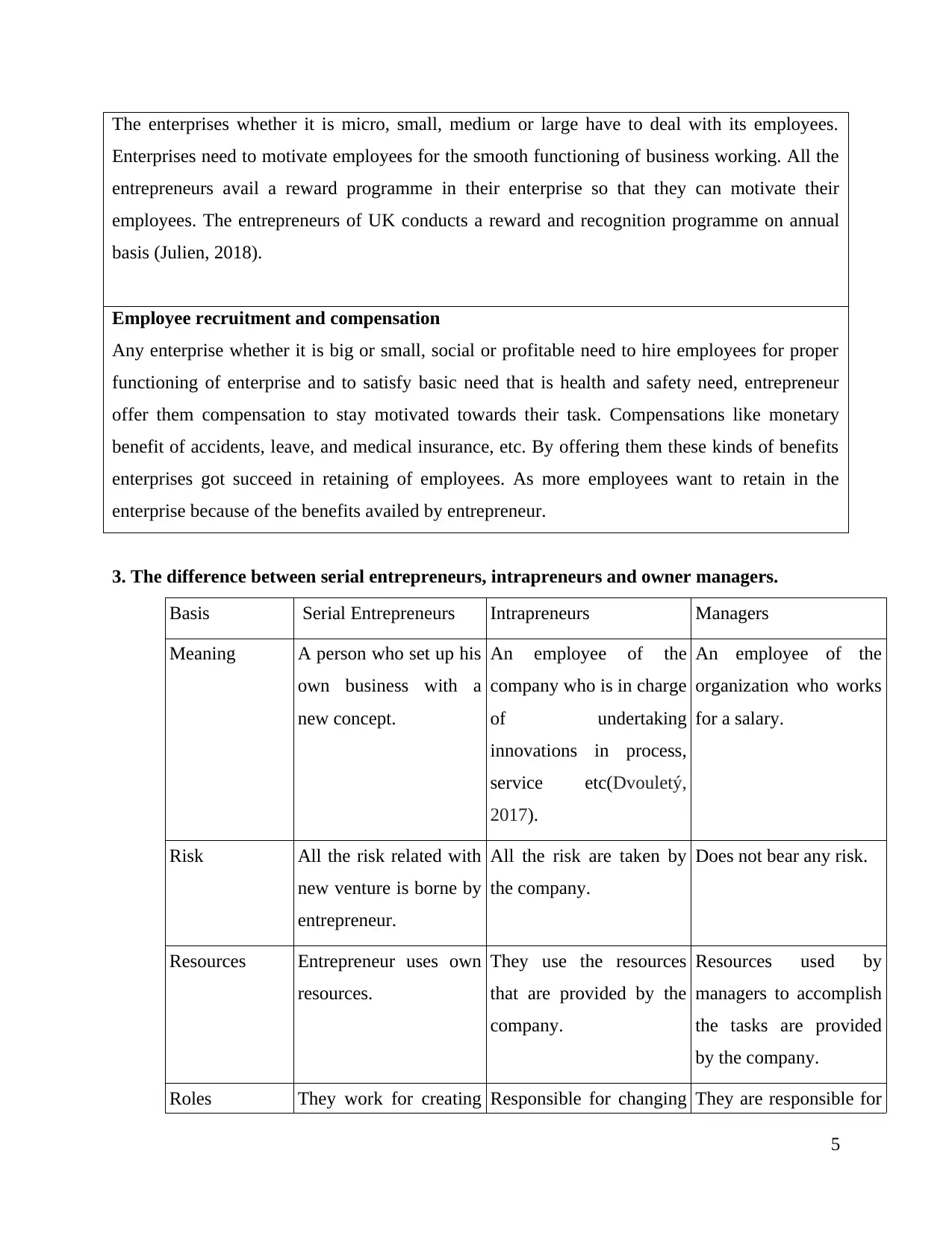
The enterprises whether it is micro, small, medium or large have to deal with its employees.
Enterprises need to motivate employees for the smooth functioning of business working. All the
entrepreneurs avail a reward programme in their enterprise so that they can motivate their
employees. The entrepreneurs of UK conducts a reward and recognition programme on annual
basis (Julien, 2018).
Employee recruitment and compensation
Any enterprise whether it is big or small, social or profitable need to hire employees for proper
functioning of enterprise and to satisfy basic need that is health and safety need, entrepreneur
offer them compensation to stay motivated towards their task. Compensations like monetary
benefit of accidents, leave, and medical insurance, etc. By offering them these kinds of benefits
enterprises got succeed in retaining of employees. As more employees want to retain in the
enterprise because of the benefits availed by entrepreneur.
3. The difference between serial entrepreneurs, intrapreneurs and owner managers.
Basis Serial Entrepreneurs Intrapreneurs Managers
Meaning A person who set up his
own business with a
new concept.
An employee of the
company who is in charge
of undertaking
innovations in process,
service etc(Dvouletý,
2017).
An employee of the
organization who works
for a salary.
Risk All the risk related with
new venture is borne by
entrepreneur.
All the risk are taken by
the company.
Does not bear any risk.
Resources Entrepreneur uses own
resources.
They use the resources
that are provided by the
company.
Resources used by
managers to accomplish
the tasks are provided
by the company.
Roles They work for creating Responsible for changing They are responsible for
5
Enterprises need to motivate employees for the smooth functioning of business working. All the
entrepreneurs avail a reward programme in their enterprise so that they can motivate their
employees. The entrepreneurs of UK conducts a reward and recognition programme on annual
basis (Julien, 2018).
Employee recruitment and compensation
Any enterprise whether it is big or small, social or profitable need to hire employees for proper
functioning of enterprise and to satisfy basic need that is health and safety need, entrepreneur
offer them compensation to stay motivated towards their task. Compensations like monetary
benefit of accidents, leave, and medical insurance, etc. By offering them these kinds of benefits
enterprises got succeed in retaining of employees. As more employees want to retain in the
enterprise because of the benefits availed by entrepreneur.
3. The difference between serial entrepreneurs, intrapreneurs and owner managers.
Basis Serial Entrepreneurs Intrapreneurs Managers
Meaning A person who set up his
own business with a
new concept.
An employee of the
company who is in charge
of undertaking
innovations in process,
service etc(Dvouletý,
2017).
An employee of the
organization who works
for a salary.
Risk All the risk related with
new venture is borne by
entrepreneur.
All the risk are taken by
the company.
Does not bear any risk.
Resources Entrepreneur uses own
resources.
They use the resources
that are provided by the
company.
Resources used by
managers to accomplish
the tasks are provided
by the company.
Roles They work for creating Responsible for changing They are responsible for
5
Paraphrase This Document
Need a fresh take? Get an instant paraphrase of this document with our AI Paraphraser
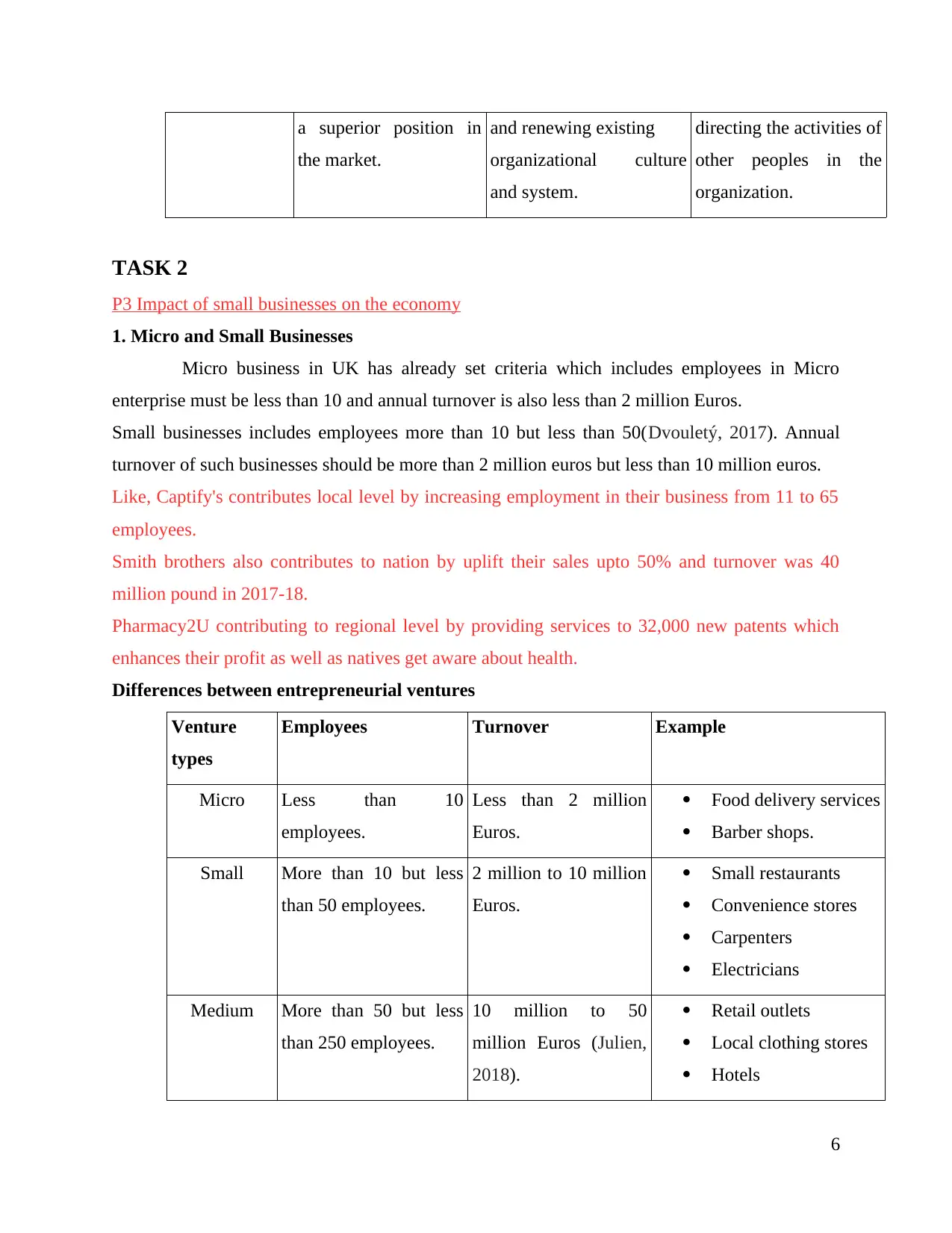
a superior position in
the market.
and renewing existing
organizational culture
and system.
directing the activities of
other peoples in the
organization.
TASK 2
P3 Impact of small businesses on the economy
1. Micro and Small Businesses
Micro business in UK has already set criteria which includes employees in Micro
enterprise must be less than 10 and annual turnover is also less than 2 million Euros.
Small businesses includes employees more than 10 but less than 50(Dvouletý, 2017). Annual
turnover of such businesses should be more than 2 million euros but less than 10 million euros.
Like, Captify's contributes local level by increasing employment in their business from 11 to 65
employees.
Smith brothers also contributes to nation by uplift their sales upto 50% and turnover was 40
million pound in 2017-18.
Pharmacy2U contributing to regional level by providing services to 32,000 new patents which
enhances their profit as well as natives get aware about health.
Differences between entrepreneurial ventures
Venture
types
Employees Turnover Example
Micro Less than 10
employees.
Less than 2 million
Euros.
Food delivery services
Barber shops.
Small More than 10 but less
than 50 employees.
2 million to 10 million
Euros.
Small restaurants
Convenience stores
Carpenters
Electricians
Medium More than 50 but less
than 250 employees.
10 million to 50
million Euros (Julien,
2018).
Retail outlets
Local clothing stores
Hotels
6
the market.
and renewing existing
organizational culture
and system.
directing the activities of
other peoples in the
organization.
TASK 2
P3 Impact of small businesses on the economy
1. Micro and Small Businesses
Micro business in UK has already set criteria which includes employees in Micro
enterprise must be less than 10 and annual turnover is also less than 2 million Euros.
Small businesses includes employees more than 10 but less than 50(Dvouletý, 2017). Annual
turnover of such businesses should be more than 2 million euros but less than 10 million euros.
Like, Captify's contributes local level by increasing employment in their business from 11 to 65
employees.
Smith brothers also contributes to nation by uplift their sales upto 50% and turnover was 40
million pound in 2017-18.
Pharmacy2U contributing to regional level by providing services to 32,000 new patents which
enhances their profit as well as natives get aware about health.
Differences between entrepreneurial ventures
Venture
types
Employees Turnover Example
Micro Less than 10
employees.
Less than 2 million
Euros.
Food delivery services
Barber shops.
Small More than 10 but less
than 50 employees.
2 million to 10 million
Euros.
Small restaurants
Convenience stores
Carpenters
Electricians
Medium More than 50 but less
than 250 employees.
10 million to 50
million Euros (Julien,
2018).
Retail outlets
Local clothing stores
Hotels
6
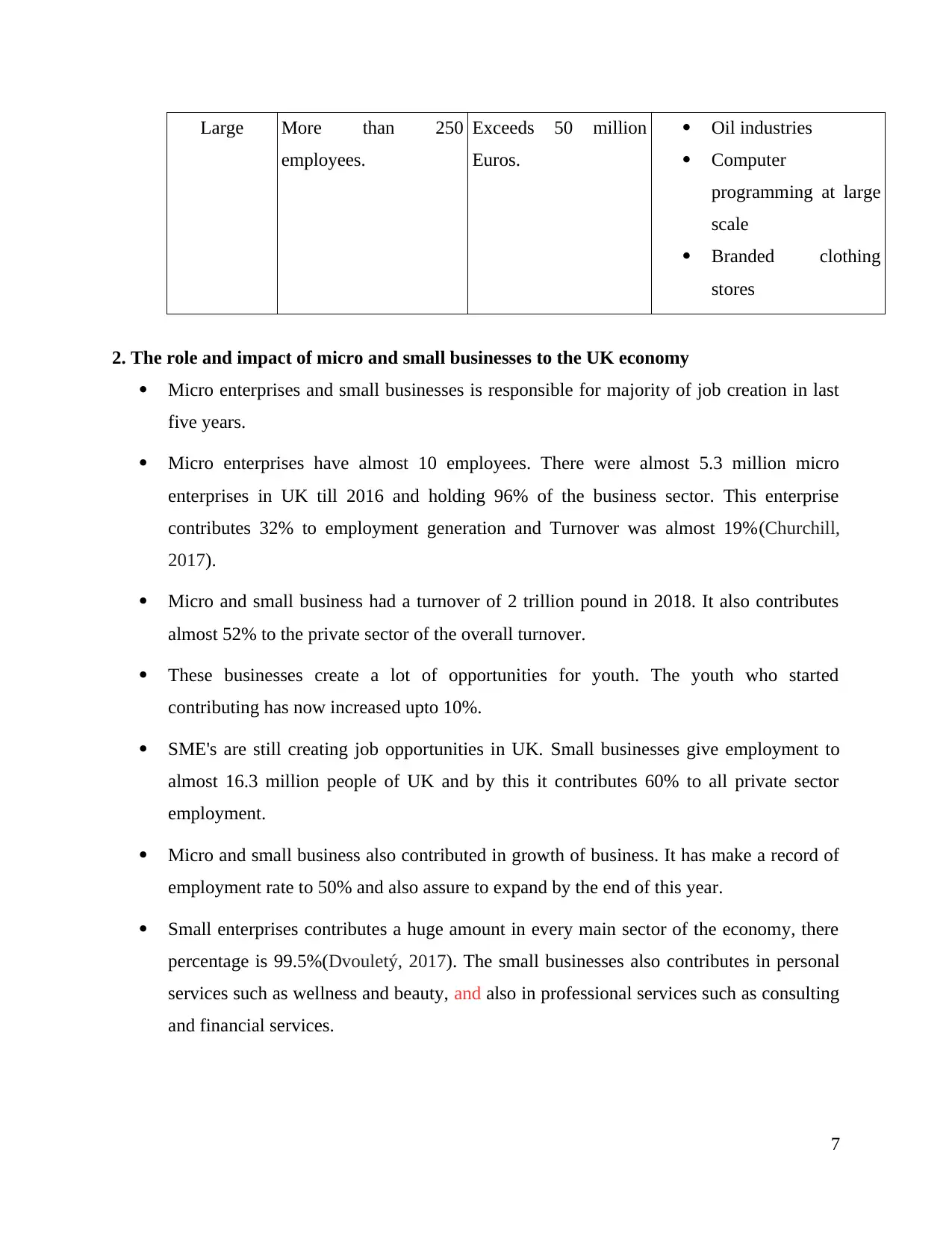
Large More than 250
employees.
Exceeds 50 million
Euros.
Oil industries
Computer
programming at large
scale
Branded clothing
stores
2. The role and impact of micro and small businesses to the UK economy
Micro enterprises and small businesses is responsible for majority of job creation in last
five years.
Micro enterprises have almost 10 employees. There were almost 5.3 million micro
enterprises in UK till 2016 and holding 96% of the business sector. This enterprise
contributes 32% to employment generation and Turnover was almost 19%(Churchill,
2017).
Micro and small business had a turnover of 2 trillion pound in 2018. It also contributes
almost 52% to the private sector of the overall turnover.
These businesses create a lot of opportunities for youth. The youth who started
contributing has now increased upto 10%.
SME's are still creating job opportunities in UK. Small businesses give employment to
almost 16.3 million people of UK and by this it contributes 60% to all private sector
employment.
Micro and small business also contributed in growth of business. It has make a record of
employment rate to 50% and also assure to expand by the end of this year.
Small enterprises contributes a huge amount in every main sector of the economy, there
percentage is 99.5%(Dvouletý, 2017). The small businesses also contributes in personal
services such as wellness and beauty, and also in professional services such as consulting
and financial services.
7
employees.
Exceeds 50 million
Euros.
Oil industries
Computer
programming at large
scale
Branded clothing
stores
2. The role and impact of micro and small businesses to the UK economy
Micro enterprises and small businesses is responsible for majority of job creation in last
five years.
Micro enterprises have almost 10 employees. There were almost 5.3 million micro
enterprises in UK till 2016 and holding 96% of the business sector. This enterprise
contributes 32% to employment generation and Turnover was almost 19%(Churchill,
2017).
Micro and small business had a turnover of 2 trillion pound in 2018. It also contributes
almost 52% to the private sector of the overall turnover.
These businesses create a lot of opportunities for youth. The youth who started
contributing has now increased upto 10%.
SME's are still creating job opportunities in UK. Small businesses give employment to
almost 16.3 million people of UK and by this it contributes 60% to all private sector
employment.
Micro and small business also contributed in growth of business. It has make a record of
employment rate to 50% and also assure to expand by the end of this year.
Small enterprises contributes a huge amount in every main sector of the economy, there
percentage is 99.5%(Dvouletý, 2017). The small businesses also contributes in personal
services such as wellness and beauty, and also in professional services such as consulting
and financial services.
7
⊘ This is a preview!⊘
Do you want full access?
Subscribe today to unlock all pages.

Trusted by 1+ million students worldwide
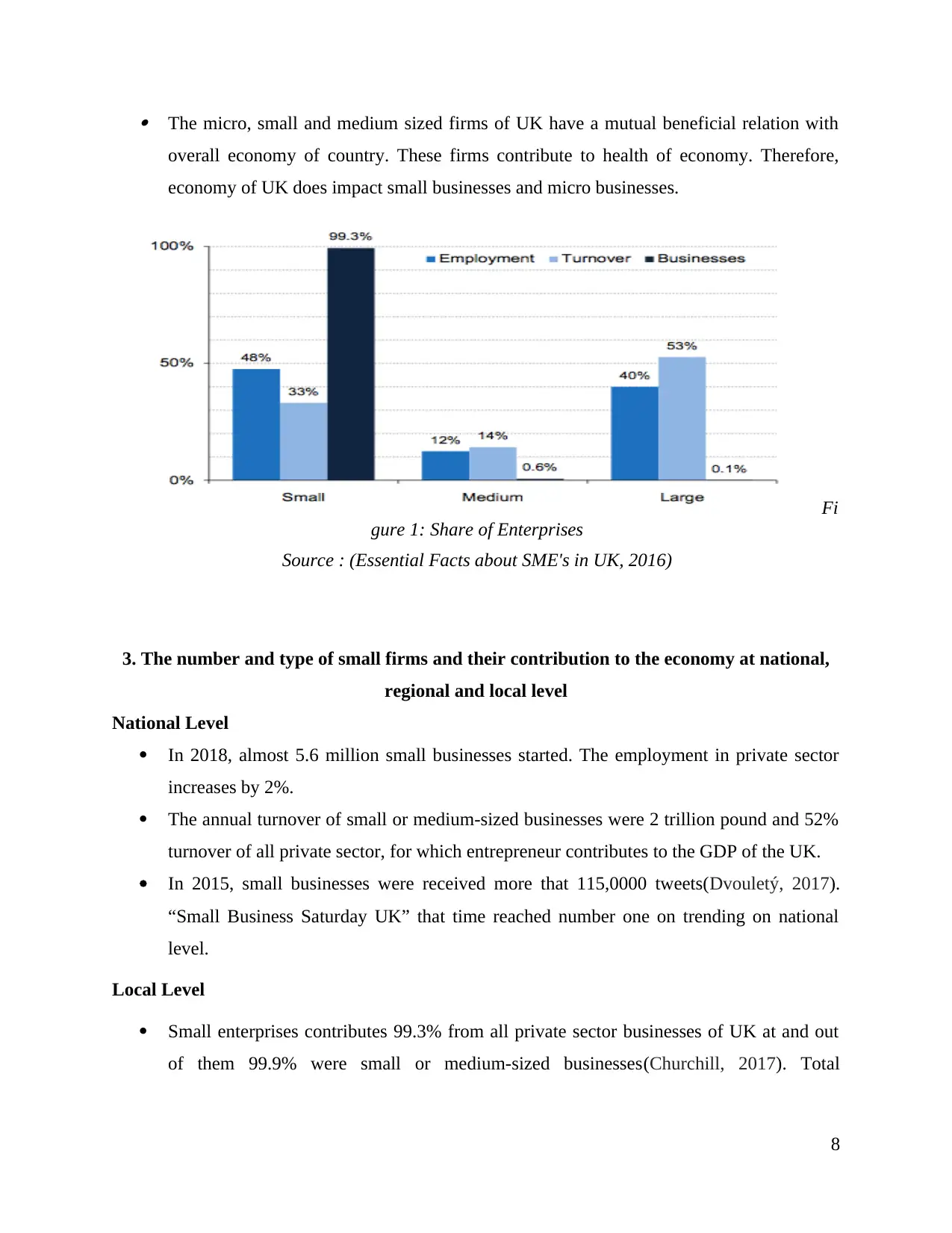
The micro, small and medium sized firms of UK have a mutual beneficial relation with
overall economy of country. These firms contribute to health of economy. Therefore,
economy of UK does impact small businesses and micro businesses.
Fi
gure 1: Share of Enterprises
Source : (Essential Facts about SME's in UK, 2016)
3. The number and type of small firms and their contribution to the economy at national,
regional and local level
National Level
In 2018, almost 5.6 million small businesses started. The employment in private sector
increases by 2%.
The annual turnover of small or medium-sized businesses were 2 trillion pound and 52%
turnover of all private sector, for which entrepreneur contributes to the GDP of the UK.
In 2015, small businesses were received more that 115,0000 tweets(Dvouletý, 2017).
“Small Business Saturday UK” that time reached number one on trending on national
level.
Local Level
Small enterprises contributes 99.3% from all private sector businesses of UK at and out
of them 99.9% were small or medium-sized businesses(Churchill, 2017). Total
8
overall economy of country. These firms contribute to health of economy. Therefore,
economy of UK does impact small businesses and micro businesses.
Fi
gure 1: Share of Enterprises
Source : (Essential Facts about SME's in UK, 2016)
3. The number and type of small firms and their contribution to the economy at national,
regional and local level
National Level
In 2018, almost 5.6 million small businesses started. The employment in private sector
increases by 2%.
The annual turnover of small or medium-sized businesses were 2 trillion pound and 52%
turnover of all private sector, for which entrepreneur contributes to the GDP of the UK.
In 2015, small businesses were received more that 115,0000 tweets(Dvouletý, 2017).
“Small Business Saturday UK” that time reached number one on trending on national
level.
Local Level
Small enterprises contributes 99.3% from all private sector businesses of UK at and out
of them 99.9% were small or medium-sized businesses(Churchill, 2017). Total
8
Paraphrase This Document
Need a fresh take? Get an instant paraphrase of this document with our AI Paraphraser
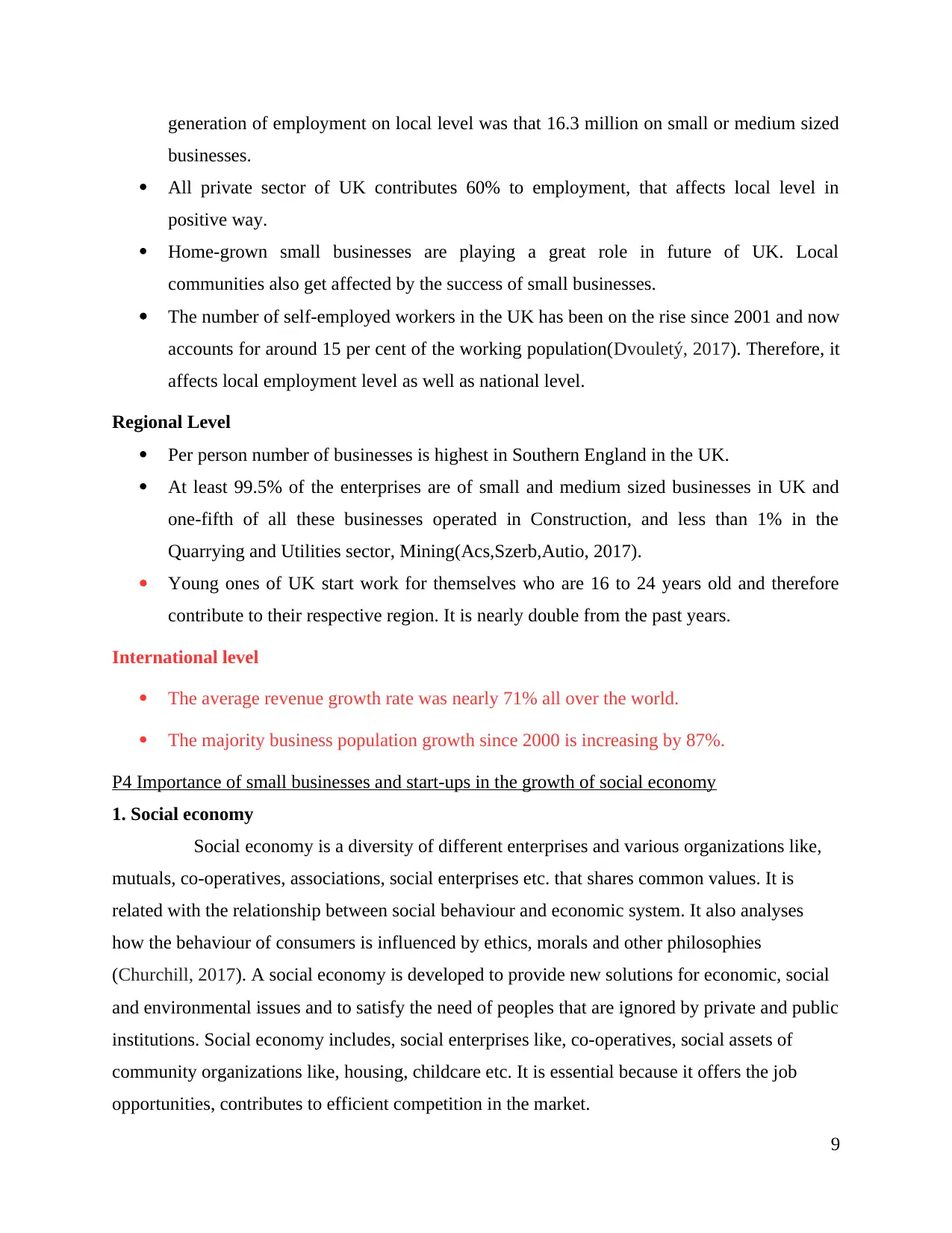
generation of employment on local level was that 16.3 million on small or medium sized
businesses.
All private sector of UK contributes 60% to employment, that affects local level in
positive way.
Home-grown small businesses are playing a great role in future of UK. Local
communities also get affected by the success of small businesses.
The number of self-employed workers in the UK has been on the rise since 2001 and now
accounts for around 15 per cent of the working population(Dvouletý, 2017). Therefore, it
affects local employment level as well as national level.
Regional Level
Per person number of businesses is highest in Southern England in the UK.
At least 99.5% of the enterprises are of small and medium sized businesses in UK and
one-fifth of all these businesses operated in Construction, and less than 1% in the
Quarrying and Utilities sector, Mining(Acs,Szerb,Autio, 2017).
Young ones of UK start work for themselves who are 16 to 24 years old and therefore
contribute to their respective region. It is nearly double from the past years.
International level
The average revenue growth rate was nearly 71% all over the world.
The majority business population growth since 2000 is increasing by 87%.
P4 Importance of small businesses and start-ups in the growth of social economy
1. Social economy
Social economy is a diversity of different enterprises and various organizations like,
mutuals, co-operatives, associations, social enterprises etc. that shares common values. It is
related with the relationship between social behaviour and economic system. It also analyses
how the behaviour of consumers is influenced by ethics, morals and other philosophies
(Churchill, 2017). A social economy is developed to provide new solutions for economic, social
and environmental issues and to satisfy the need of peoples that are ignored by private and public
institutions. Social economy includes, social enterprises like, co-operatives, social assets of
community organizations like, housing, childcare etc. It is essential because it offers the job
opportunities, contributes to efficient competition in the market.
9
businesses.
All private sector of UK contributes 60% to employment, that affects local level in
positive way.
Home-grown small businesses are playing a great role in future of UK. Local
communities also get affected by the success of small businesses.
The number of self-employed workers in the UK has been on the rise since 2001 and now
accounts for around 15 per cent of the working population(Dvouletý, 2017). Therefore, it
affects local employment level as well as national level.
Regional Level
Per person number of businesses is highest in Southern England in the UK.
At least 99.5% of the enterprises are of small and medium sized businesses in UK and
one-fifth of all these businesses operated in Construction, and less than 1% in the
Quarrying and Utilities sector, Mining(Acs,Szerb,Autio, 2017).
Young ones of UK start work for themselves who are 16 to 24 years old and therefore
contribute to their respective region. It is nearly double from the past years.
International level
The average revenue growth rate was nearly 71% all over the world.
The majority business population growth since 2000 is increasing by 87%.
P4 Importance of small businesses and start-ups in the growth of social economy
1. Social economy
Social economy is a diversity of different enterprises and various organizations like,
mutuals, co-operatives, associations, social enterprises etc. that shares common values. It is
related with the relationship between social behaviour and economic system. It also analyses
how the behaviour of consumers is influenced by ethics, morals and other philosophies
(Churchill, 2017). A social economy is developed to provide new solutions for economic, social
and environmental issues and to satisfy the need of peoples that are ignored by private and public
institutions. Social economy includes, social enterprises like, co-operatives, social assets of
community organizations like, housing, childcare etc. It is essential because it offers the job
opportunities, contributes to efficient competition in the market.
9
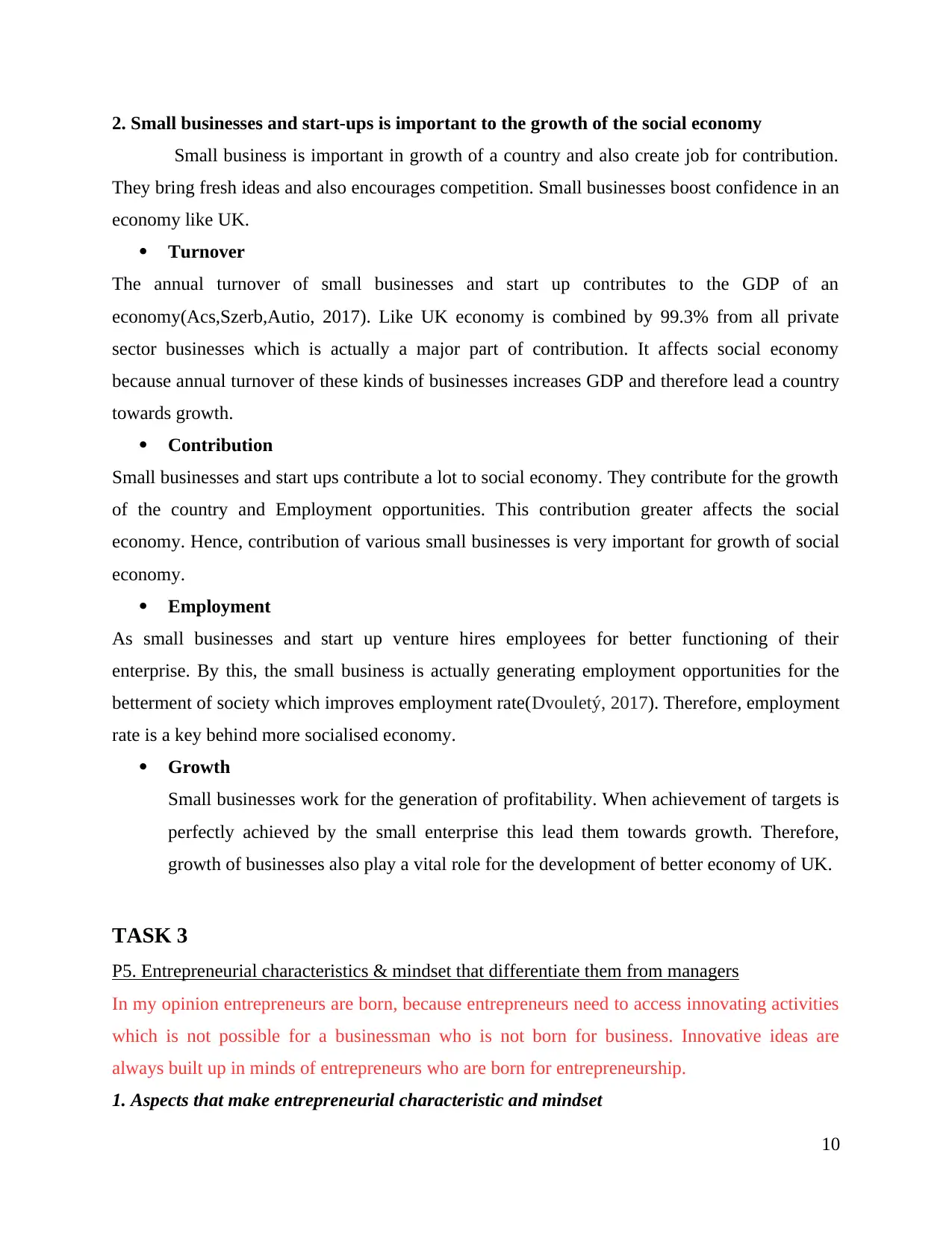
2. Small businesses and start-ups is important to the growth of the social economy
Small business is important in growth of a country and also create job for contribution.
They bring fresh ideas and also encourages competition. Small businesses boost confidence in an
economy like UK.
Turnover
The annual turnover of small businesses and start up contributes to the GDP of an
economy(Acs,Szerb,Autio, 2017). Like UK economy is combined by 99.3% from all private
sector businesses which is actually a major part of contribution. It affects social economy
because annual turnover of these kinds of businesses increases GDP and therefore lead a country
towards growth.
Contribution
Small businesses and start ups contribute a lot to social economy. They contribute for the growth
of the country and Employment opportunities. This contribution greater affects the social
economy. Hence, contribution of various small businesses is very important for growth of social
economy.
Employment
As small businesses and start up venture hires employees for better functioning of their
enterprise. By this, the small business is actually generating employment opportunities for the
betterment of society which improves employment rate(Dvouletý, 2017). Therefore, employment
rate is a key behind more socialised economy.
Growth
Small businesses work for the generation of profitability. When achievement of targets is
perfectly achieved by the small enterprise this lead them towards growth. Therefore,
growth of businesses also play a vital role for the development of better economy of UK.
TASK 3
P5. Entrepreneurial characteristics & mindset that differentiate them from managers
In my opinion entrepreneurs are born, because entrepreneurs need to access innovating activities
which is not possible for a businessman who is not born for business. Innovative ideas are
always built up in minds of entrepreneurs who are born for entrepreneurship.
1. Aspects that make entrepreneurial characteristic and mindset
10
Small business is important in growth of a country and also create job for contribution.
They bring fresh ideas and also encourages competition. Small businesses boost confidence in an
economy like UK.
Turnover
The annual turnover of small businesses and start up contributes to the GDP of an
economy(Acs,Szerb,Autio, 2017). Like UK economy is combined by 99.3% from all private
sector businesses which is actually a major part of contribution. It affects social economy
because annual turnover of these kinds of businesses increases GDP and therefore lead a country
towards growth.
Contribution
Small businesses and start ups contribute a lot to social economy. They contribute for the growth
of the country and Employment opportunities. This contribution greater affects the social
economy. Hence, contribution of various small businesses is very important for growth of social
economy.
Employment
As small businesses and start up venture hires employees for better functioning of their
enterprise. By this, the small business is actually generating employment opportunities for the
betterment of society which improves employment rate(Dvouletý, 2017). Therefore, employment
rate is a key behind more socialised economy.
Growth
Small businesses work for the generation of profitability. When achievement of targets is
perfectly achieved by the small enterprise this lead them towards growth. Therefore,
growth of businesses also play a vital role for the development of better economy of UK.
TASK 3
P5. Entrepreneurial characteristics & mindset that differentiate them from managers
In my opinion entrepreneurs are born, because entrepreneurs need to access innovating activities
which is not possible for a businessman who is not born for business. Innovative ideas are
always built up in minds of entrepreneurs who are born for entrepreneurship.
1. Aspects that make entrepreneurial characteristic and mindset
10
⊘ This is a preview!⊘
Do you want full access?
Subscribe today to unlock all pages.

Trusted by 1+ million students worldwide
1 out of 21
Related Documents
Your All-in-One AI-Powered Toolkit for Academic Success.
+13062052269
info@desklib.com
Available 24*7 on WhatsApp / Email
![[object Object]](/_next/static/media/star-bottom.7253800d.svg)
Unlock your academic potential
Copyright © 2020–2026 A2Z Services. All Rights Reserved. Developed and managed by ZUCOL.





